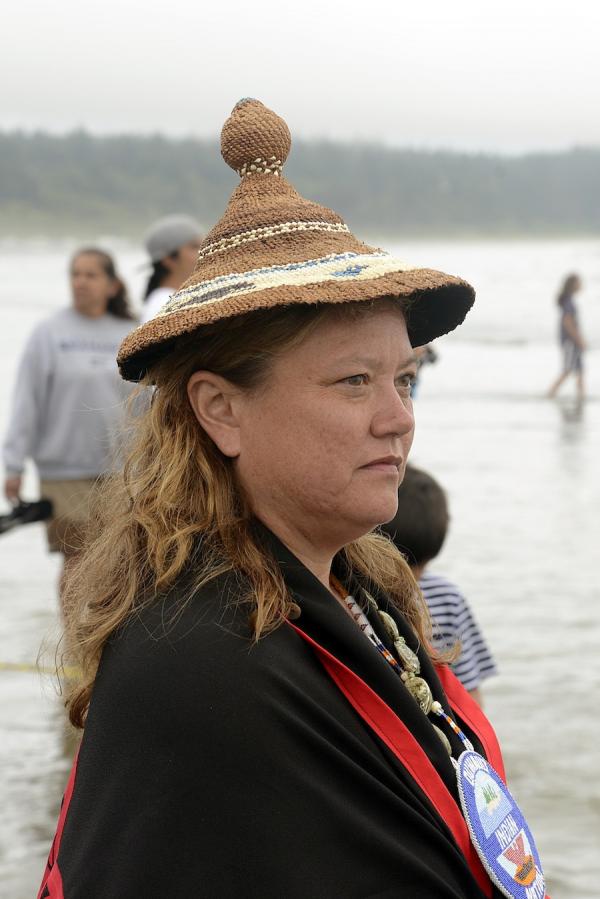President Fawn Sharp of the Quinault Indian Nation says she is happy to participate on the Carbon Emissions Reduction Task Force Governor Jay Inslee created by executive order yesterday [April 29], but advises that “genuine state-tribal cooperation, communication and government-to-government relations will be essential to the success of any effort to address the many challenges posed by climate change.”
Sharp, who is also President of the Affiliated Tribes of Northwest Indians, encompassing six Northwest states, and Area Vice President of the National Congress of American Indians, is the only tribal member of the Governor’s task force.
President Sharp said, “Climate Change is the greatest environmental disaster of our generation and its impacts are felt both near and far. The fact is that tribes have preceded other governments in addressing climate change issues, and it is time for our words to be heard, our warnings to be acknowledged and our programs to be recognized.”
She said the reason tribes have moved forward with programs to address the effects of climate change while other governments have been stymied is that it is embedded in the tribal culture to care for the land in a sustainable manner. “Stewardship of our natural resources and environment is something we learn at a young age. We understand the big picture—the economic, policy, environmental and cultural values of sustainability and the responsibility we all have to our children and future generations. Those are the values that must be prioritized if we are to meet the climate change challenge.”
In signing the order, the Governor outlined a series of steps to cut carbon pollution in Washington and advance development and use of clean energy technologies, and said, “This is the right time to act, the right place to act and we are the right people to act. We will engage the right people, consider the right options, ask the right questions and come to the right answers — answers that work for Washington.”
“Whether it’s the warming of the Pacific Ocean, Hurricane Sandy, the tornadoes across the country or the Oso landslide, the melting of our Mt. Anderson Glacier or the breaching of our Taholah seawall, the link to climate change is clear to us. It has been for a long time. And so is the absolute need to take action,” said Sharp.
“It’s a primary reason why I have agreed to work with the Governor on his Carbon Emissions Reduction Task Force. It’s a key reason why we have taken a strong stand against the proposal to build oil terminals in Grays Harbor and substantially increase the number and frequency of oil trains and tankers. It’s why we are reaching out to strengthen alliances with neighboring communities and entities of all kinds and it’s why we have been so heavily engaged in the effort to resolve the climate change challenge for many years — through political, education and habitat-related programs.
“Quinault is a nation of people who, like their ancestors for thousands of years, fish, hunt and gather. The core of our economy is based on health and sustainable natural resources—a clean and vibrant ecosystem. We are also a nation blessed with thousands of acres of forest land. We do not manage our forests to the detriment of our fishing and hunting, but the other way around. Managing holistically, with respect for our descendants, and their needs is the key. These are the lessons of our ancestors, lessons that oil tycoons and timber barons never learned to appreciate.
We are a people who are determined to practice good stewardship. Sometimes that means doing habitat work in the Quinault River, something we have done extensively for many years. Sometimes it means taking part in international climate change summits—providing a leadership role in such efforts as the United Nations’ Conference of Parties (COP 14) in Poznan, Poland in 2009 or the First Stewards Summit in Washington D.C.,” said Sharp.
Quinault Nation established a comprehensive set of climate change policies in 2009, before Congress considered introducing its national policies. We have advocated and advanced our climate change-related interests locally, regionally, nationally and internationally. “We have asked the President and Congress to understand the connection between climate change and such impacts as the decline of our Blueback salmon run and the destruction that is now occurring with shellfish and other species in the ocean due to acidification and hypoxia. Other tribes have worked alongside us, pushing for action by the State of Washington, the United States and the United Nations, for many years. It is our heritage, and right, to do so,” said Sharp.
“We believe it’s time to call to end the nonsensical debate in the Legislature and in Congress about whether it exists. It does, and it is very serious.
“Year in and year out we are all facing the deadly consequences of a century of environmental contempt, and ignoring that fact will not make the challenge go away. It is time for people to treat our natural environment with the respect it deserves,” she said.
Read more at http://indiancountrytodaymedianetwork.com/2014/05/01/climate-change-real-lets-fight-it-together-154682?page=0%2C1

